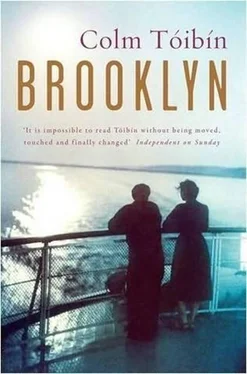Eilis tried to look blank.
"You had better sit down."
Miss McAdam moved over to the kettle as it began to boil and she filled the teapot before she spoke again.
"Do you know why Miss Keegan left?" she asked.
"Why should I know?"
"So you don't know? I thought so. Well, that Kehoe woman knows and all the others know."
"Where has Miss Keegan gone? Was she in trouble?"
"To Long Island. And for good reasons."
"What happened?"
"She was followed home." Miss McAdam's eyes seemed to glitter with excitement as she spoke. She poured the tea slowly.
"Followed?"
"Not one night but two, or maybe more for all I know."
"You mean followed to this house?"
"That's exactly what I mean."
Miss McAdam sipped her tea while looking at Eilis sharply all the time.
"Who followed her?"
"A man."
As Eilis put milk and sugar into her tea, she remembered something that her mother always said.
"But sure if a man ran off with Miss Keegan, he'd drop her the minute he got to the first lamp-post and he could see her clearly."
"But it wasn't an ordinary man."
"What do you mean?"
"The last time he followed her he exposed himself to her. He was that sort of man."
"Who told you this?"
"Miss Keegan spoke to Miss Heffernan and myself privately before she left. She was followed to the very door of this house. And as she walked down the steps, the man exposed himself."
"Did she call the police?"
"She certainly did, and then she packed her bags. She thinks she knows where the man lives. And he followed her before."
"Did she tell the police all of this?"
"Yes, but there is nothing they can do unless she is ready to identify him and she isn't ready to do that. So she packed her bags. And she's moved in with her brother and his wife in Long Island. And then, to make matters worse, the Kehoe woman wanted to move me down to Miss Keegan's room. She went on about it being the best room in the house. I put her in her place. And Miss Heffernan is in a terrible state. And Diana has refused to stay in the basement on her own. So she put you down there because none of the others would go."
Eilis noticed how pleased with herself Miss McAdam seemed. As she watched the older woman sipping her tea, it occurred to Eilis that this could easily be her revenge on Eilis and Mrs. Kehoe over the room. On the other hand, she reckoned, it could be true. Mrs. Kehoe could have used her, the only lodger who did not seem to know why Miss Keegan had left. But then she thought that Mrs. Kehoe could not have been sure in the days before she moved her to the basement that Eilis would not find out. The more she watched Miss McAdam, the more she was convinced that if she was not inventing the story of the man who exposed himself, then she was exaggerating it. She wondered if Miss McAdam had been encouraged to do this by the other lodgers or if she were doing it alone.
"It's a lovely room," Eilis said.
"Lovely it may be," Miss McAdam replied. "And you know we all wanted that room when Miss Keegan got it, all the better to stop that Kehoe woman snooping around you every time you came in the door. But I wouldn't want to be down there now with the light on for all to see. Maybe I shouldn't say any more."
"Say what you like."
"Well, for someone who walks home alone at night, you seem very calm."
"If anyone exposes himself to me, you'll be the first to know."
"If I am still here," Miss McAdam said. "It might be Long Island for us all."
In the days that followed, Eilis could not make her mind up about what Miss McAdam had told her. At meals in the kitchen with the rest of the lodgers she veered from believing that all of them had conspired to frighten her in revenge for her being installed in Miss Keegan's room to believing that Mrs. Kehoe had placed her there not because she favoured her but because she thought she was the least likely to protest. She studied their faces as they addressed her, but nothing became clear. She wanted to allow for the possibility that everyone's motives were good, but it was unlikely, she thought, unlikely that Mrs. Kehoe had genuinely given her the room out of pure generosity and unlikely also that Miss McAdam and the others really did not mind this and had merely wanted to warn her about the man who had followed Miss Keegan so that she would be careful. She wished she had a real friend among the lodgers whom she could consult. And she wondered then if she herself were the problem, reading malice into motives when there was none intended. If she woke in the night, or found time going slowly at work, she went over it all again, blaming Mrs. Kehoe one moment, Miss McAdam and her fellow lodgers the next, and then blaming herself, eventually coming to no conclusion except that it would be best if she stopped thinking about it altogether.
The following Sunday, Father Flood announced that the parish hall was now ready to run dances to raise funds for charities in the parish, that he had procured Pat Sullivan's Harp and Shamrock Orchestra and that he would ask the parishioners to spread the word that the first dance would be held on the last Friday of January and then every Friday night after that until further notice.
When Mrs. Kehoe came briefly into the kitchen that evening, having left her poker session, and sat at the table, the lodgers were discussing the dance.
"I hope Father Flood knows what he's doing," Mrs. Kehoe said. "They ran a dance in that selfsame parish hall after the war and they had to close it because of immorality. Some of the Italians started to come looking for Irish girls."
"Well, I don't see what's wrong with that," Diana said. "My father is Italian and I think he met my mother at a dance."
"I'm sure he is very nice," Mrs. Kehoe said, "but after the war some of the Italians were very forward."
"They're lovely-looking," Patty said.
"Be that as it may," Mrs. Kehoe said, "and I'm sure some of them are lovely and all, but from what I heard great care should be taken with many of them. But that's enough about Italians. It might be better for us all if we changed the subject."
"I hope there's not going to be Irish dancing," Patty said.
"Pat Sullivan's band are lovely," Sheila Heffernan said. "They can do everything from Irish tunes to waltzes and foxtrots and American tunes."
"That's good for them," Patty said, "as long as I can sit it out for the céilí stuff. God, it should be abolished. In this day and age!"
"If you're not lucky," Miss McAdam said, "you'll be sitting down all night, unless of course it's ladies' choice."
"That's enough about the dance," Mrs. Kehoe said. "I shouldn't have come into the kitchen at all. Just be careful. That's all I have to say. You have your whole life ahead of you."
Over the next while, as the night of the dance approached, the house broke into two factions: the first, which consisted of Patty and Diana, wanted Eilis to come with them to a restaurant where they would meet other people going to the dance, but the others-Miss McAdam and Sheila Heffernan-insisted that the restaurant in question was really a saloon bar and that the people who would gather there often were not sober or indeed decent. They wanted Eilis to go with them directly from Mrs. Kehoe's house to the parish hall only as a way of supporting a good cause and to leave as early as was polite.
"One of the things I don't miss about Ireland is the cattle mart on a Friday and Saturday night, and I'd be happy to stay single rather than have half-drunk fellows with terrible hair oil pushing me around."
"Where I'm from," Miss McAdam said, "we didn't go out at all and none of us were any the worse for it."
"And how did you meet fellows?" Diana asked.
"Will you look at her?" Patty interjected. "She's never met a fellow in her life."
Читать дальше












